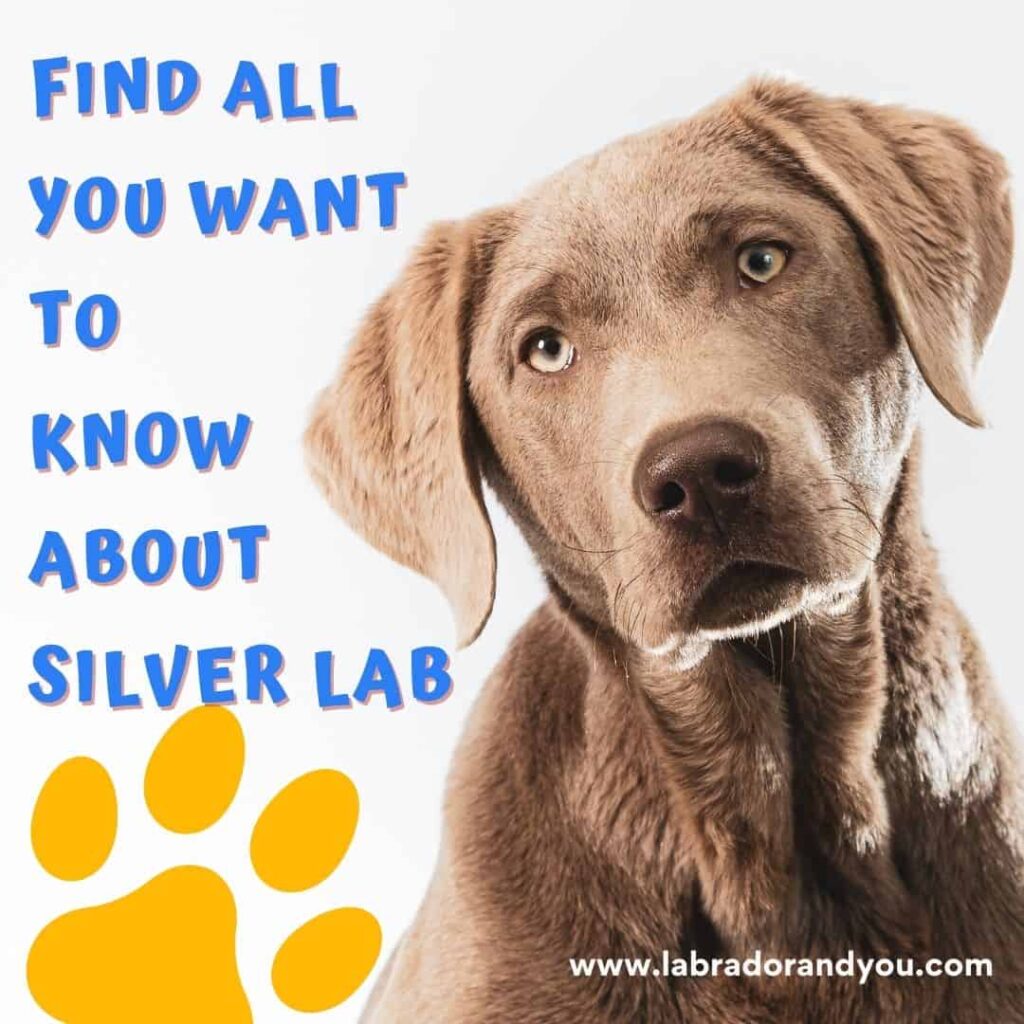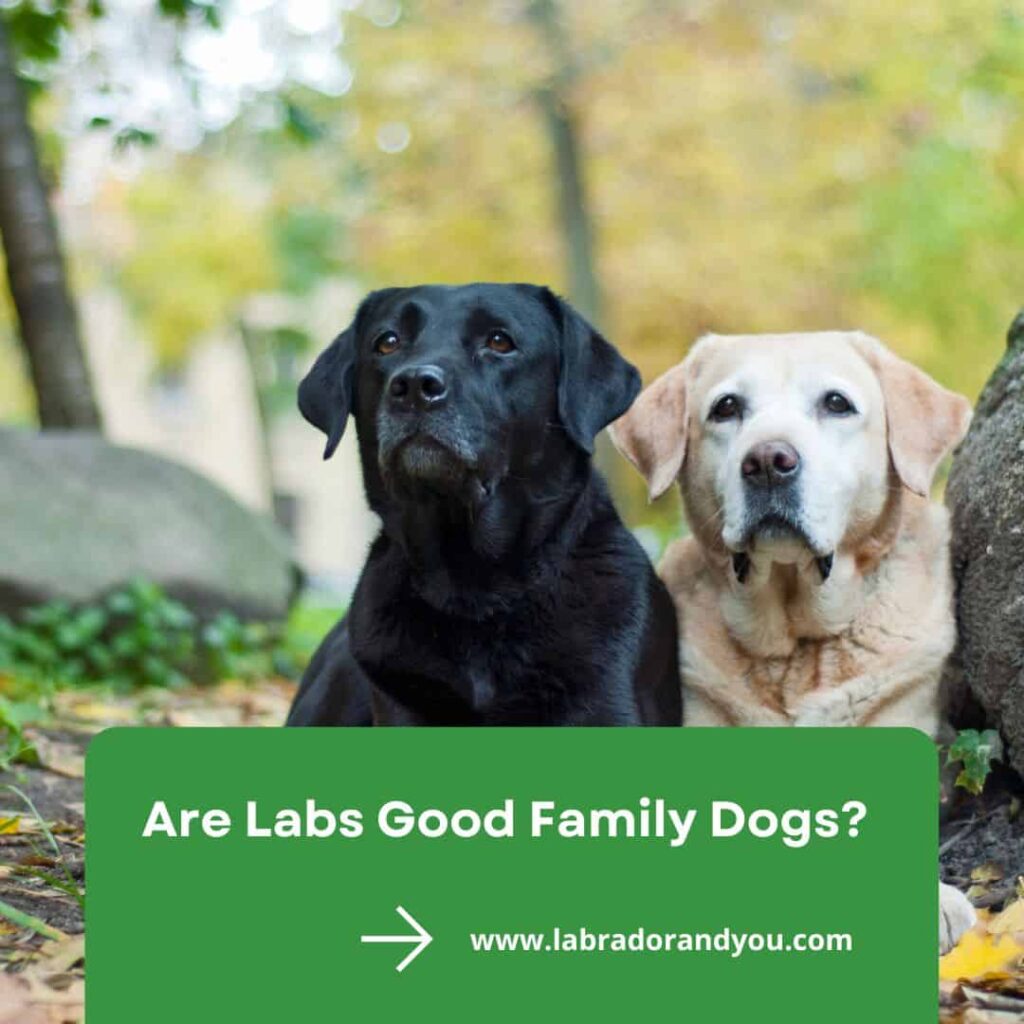Yes, dogs can indeed enjoy the occasional cheesy treat. So can dogs eat cheese? Despite some common misconceptions, this dairy product may be given to your furry friend responsibly and cautiously.
As a high-fat food item with weight gain potential and obesity in dogs, moderation is key when incorporating cheese into their diet. Some types of cheeses also contain toxic ingredients like onions, garlic, or chives that could harm your pet.
Therefore, always double-check any added extras before sharing a bite with your pup. Not all dogs digest cheese well due to varying amounts of lactase(the enzyme needed to break down lactose) in different breeds. For instance, Schnauzers and Cocker Spaniels are more intolerant of cheese than other dog breeds.
When introducing a new food, including cheese, into your pup’s regimen – monitor their reaction closely. If you observe intestinal upset post-consumption – a veterinarian visit should be your immediate action.
Feeding them low-fat basic cheeses like mozzarella, cottage cheese, or soft goat cheese might be beneficial. They have lower fat content while providing protein and calcium rewards associated with regular cheese varieties.
The Benefits of Cheese for Dogs
In healthy dog treats, cheese is a versatile choice that provides a bunch of nutrients. It is a source of calcium, protein, vitamin A, B-complex vitamins, and fats that maintain healthy skin and fur.
Most dogs are naturally drawn to the delicious taste of cheese, making it an excellent clicker training tool. It provides extra motivation during obedience drills, skills development, or tricky commands.
The health benefits associated with cheese offer more than just paw-licking goodness. With its high protein content, cheese helps support muscle growth and repair. Its calcium content contributes to strong bones and teeth.
Another advantage of cheese is the essential fatty acids in certain cheeses that promote healthier skin and coat. For pups needing medication assistance, disguising pills within their favorite dairy treat can make medicine time less stressful.
However beneficial it might sound, pet parents should remember that not all kinds of cheese serve well on Fido’s plate. Therefore, pay attention to portion sizes and types!
And if they’re lactose intolerant – low-fat options like cottage cheese have reduced lactose levels. It minimizes the chance of digestive issues while ensuring they still savor their snack times!
Types of Cheese Dogs Can Eat Safely Or Avoid
Dogs can safely enjoy mozzarella, cottage cheese, and soft cheeses like goats. Avoiding cheese with herbs or natural ingredients like garlic, onions, and chives is essential, as they are toxic to them.
Can Dogs Eat Cream Cheese?
Plain cream cheese might be your go-to bagel spread, but it’s not the healthiest choice for a dog. The smearing of cream cheese has high fat and calorie content making it a less-than-ideal dog snack. This calorie-dense dairy product can easily pack unwanted pounds if fed too many fatty foods.
This is worrisome, as obesity increases the risk of pancreatitis. While some pups might beg with puppy dog eyes, remember to keep their overall health at the forefront.
Not all dogs digest cheese well, either. It causes stomach issues from feeding them different types of cream cheese on a regular basis. While an occasional nibble won’t harm most dogs, it’s wiser to lean towards safer low-fat typical cheeses like mozzarella or cottage cheese.
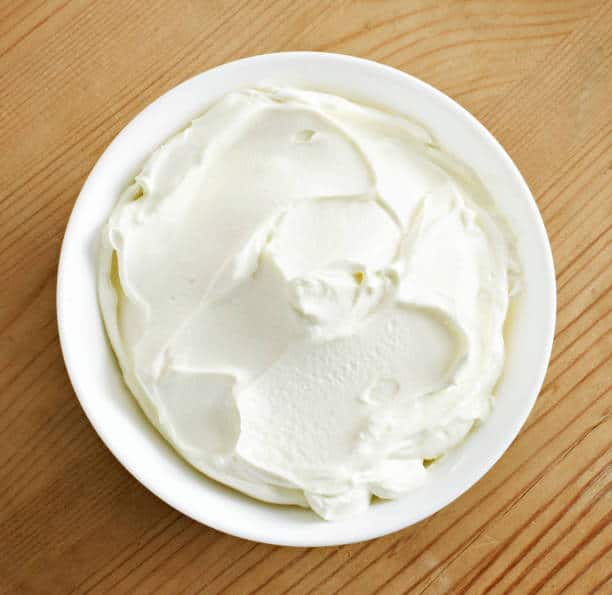
Can Dogs Eat Mac And Cheese?
Like other types, mac and cheese can be a safe treat for dogs in moderation. The high-fat content of the cheese, combined with pasta’s carbohydrates, could quickly become a concern.
Certain breeds are more prone to pancreatitis due to excessive intake of fatty foods, including mac and cheese. Ensure you’re serving a portion that fits within your dog’s daily calorie intake to avoid significant health issues.
Some packaged types of cheese contain harmful ingredients like onions or garlic, so always double-check.
Can Dogs Eat Mozzarella Cheese?
Dogs can safely consume mozzarella cheese but in moderation. It is lower in fat and sodium than other cheese kinds, making it a better choice. Mozzarella is an excellent source of protein, calcium, essential fatty acids, and B-complex vitamins that can contribute to a dog’s overall health. However, mozzarella should be given sparingly and monitored for allergic reactions or digestive upset.
Can Dogs Eat Parmesan Cheese?
Parmesan cheese can be safely fed to dogs in moderation. Cheese should not make up much of the canine diet due to its high fat content. Feeding excessive amounts of cheese can lead to chances of weight gain and fatal pancreatitis.
Parmesan cheese can be given as an occasional treat in moderation. It contains protein, calcium, essential fatty acids, and B-complex vitamins that benefit their overall health.

Can Dogs Eat Blue Cheese?
Pieces from the blue cheese family should never be given to dogs as they can cause vomiting, diarrhea, high temperature, and seizures. This is because blue cheeses contain roquefortine C, which is toxic to dogs.
Even a piece of cheese can lead to serious health issues. Keep all blue cheeses out of their reach. Avoid feeding them blue-veined cheese as a treat or part of their complete diet.
When sharing some cheesy goodness with your canine companion, opt for safer options like aged cheddar cheese or mozzarella. These aged cheeses are better for a dog with a sensitive stomach.
Can Dogs Eat Swiss Cheese?
Swiss cheese is generally safe for dogs to eat but should be given in moderation. Excessive consumption of Swiss cheese can lead to pancreatitis, a serious and potentially fatal dog illness.
Avoid Swiss cheese with common ingredient types like garlic or onions. Besides, consult your veterinarian about your furry friend’s dietary needs and restrictions.
Can Dogs Eat String Cheese?
Yes, dogs can eat bites of string cheese as long as it is in moderation. String cheese is a popular junk food for both humans and dogs. Many dog owners use it as a reward training treat for its convenient size and shape.
Consider the nutritional content of string cheese before feeding it to your furry friend. String cheese is high in fat, so excessive consumption can lead to weight issues and obesity. Offer string cheese as an occasional treat rather than making it a regular food.
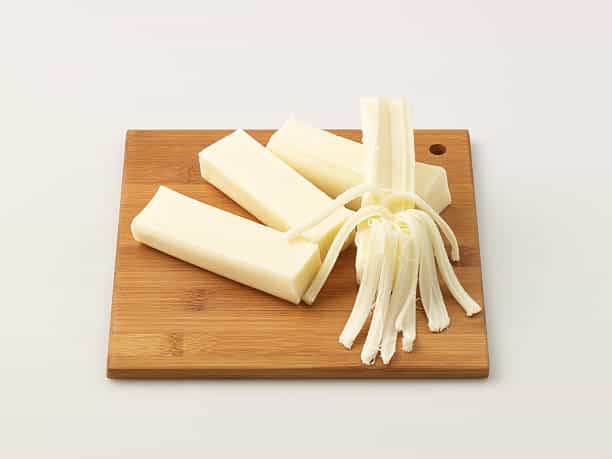
Can Dogs Eat Feta Cheese?
Feta cheese should be avoided when feeding dogs cheese. While sharing this tasty treat with our furry friends may be tempting, feta cheese is high in sodium and fat.
Feta cheese often contains additional ingredients like herbs and vegetables like garlic and onions. Even small bites of cheese can cause issues as they are toxic to dogs. When treating your four-legged companion, stick with safer options like low-fat cheeses like mozzarella or cottage cheese.
Can Dogs Eat Goat Cheese?
Goat cheese can be safely consumed by dogs in moderation. It is healthier than other cheese options due to its lower fat and sodium content. Goat cheese is easier for dogs to digest as it contains less lactose, reducing the risk of digestive issues.
Some pet owners even mix small amounts of goat cheese into their dog’s diet with regular dry food. It provides an extra dose of protein and additional nutrients like calcium and vitamin A.
Can Dogs Eat American Cheese?
Yes, dogs can eat American cheese. However, moderation is essential, as it is high in fat and can contribute to weight gain and obesity. Excessive consumption of American cheese also increases the risk of pancreatitis.
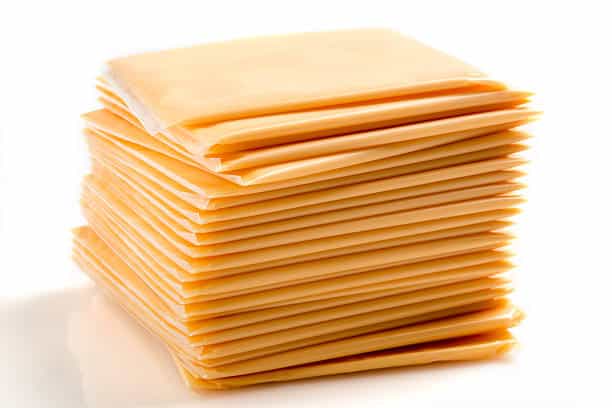
Can Dogs Eat Provolone Cheese?
Provolone cheese can be safely consumed by dogs in moderation. However, dogs should not have Provolone cheese as a regular food. It is okay to offer Provolone cheese as an occasional treat or reward for your furry friend. Overfeeding dogs with this common cheese can lead to obesity and fatty deposits.
Can Dogs Eat Brie Cheese?
Brie cheese is not safe for dogs to eat. It contains high fat and lactose, potentially harming their digestive system. Feeding dogs brie cheese can lead to pancreatitis, a serious, fatal illness. Some wide varieties of brie cheese may contain toxic ingredients like garlic and onions.
Can Dogs Eat Gouda Cheese?
Dogs can eat Gouda cheese in moderation as part of their balanced dog food. Gouda cheese is a semi-hard cheese that is safe. It should be given sparingly due to its high fat content and not chunks of cheese.
While a cube of cheese is alright, feeding excessively can lead to weight gain and obesity in dogs, negatively affecting their overall health.
Can Dogs Eat Cheese Puffs?
Cheese puffs are not recommended for dogs. These popular snack foods contain high fat and extra calories, which can contribute to weight gain and obesity in dogs if consumed regularly. Cheese puffs often contain garlic, onions, and chives that can lead to bad reactions.
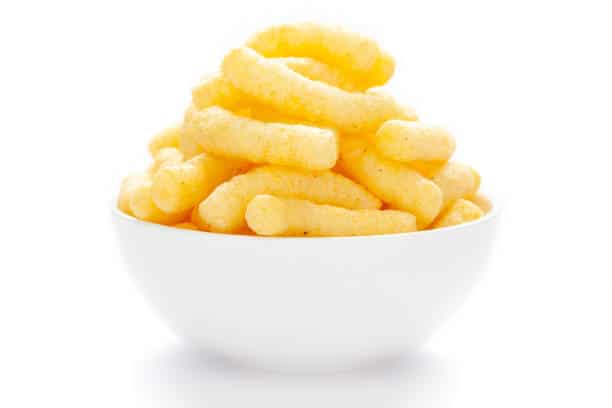
Can Dogs Eat Cheese Pizza?
Cheese pizza is a popular treat for many people, but can dogs enjoy it too? While dogs can technically eat cheese pizza, it’s not the best choice for their health.
Cheese pizza contains high levels of fat and sodium, which can lead to health problems in dogs. Additions to cheese pizza, like herbs, onion, etc., can be toxic and must be avoided.
Can Dogs Eat Ricotta Cheese?
Ricotta cheese is generally safe for dogs to eat in small quantities. It is a low-fat cheese that contains protein, calcium, and essential fatty acids. However, like with any food, moderation is key. Too much ricotta cheese can lead to weight gain and obesity.
Can Dogs Eat Cheese Sticks?
Cheese sticks are not recommended for dogs. They typically have high fat and are a key calorie source. Cheese sticks often contain dangerous ingredients like garlic and chives.
Can Dogs Eat Pepper Jack Cheese?
Pepper Jack spicy cheeses are semi-soft cheese that combines Monterey Jack with spicy chili peppers and other seasonings. While dogs can technically eat Pepper Jack cheese, it’s important to be cautious.
These high-fat cheeses make a less healthy option, especially if consumed in large quantities. Offering Pepper Jack cheese as an occasional treat is better than making it a regular part of your dog’s diet.
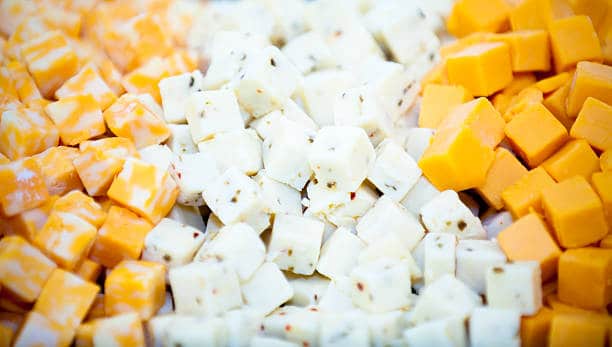
Can Dogs Eat Cheese Balls?
While cheese is generally safe for dogs in moderation, cheese balls may not be the best choice. These crispy cheese snacks typically have high fat and excess salt content.
Cheese balls often contain artificial food color and preservatives that may not be suitable for our canine friends. When choosing their cheese treats, prioritize your dog’s overall health and well-being.
Can Dogs Eat Grilled Cheese?
Many of us enjoy grilled cheese, a classic comfort food, but can dogs eat it too? While a bite of cheese can be safe for dogs, remember that grilled cheese often contains butter and bread. It may not be the best choice for our furry friends. Butter for dogs can be high in fat and lead to pancreatitis, while bread may cause digestive issues.
Can Dogs Eat Broccoli And Cheese?
Dogs should not be fed broccoli and cheese together. While broccoli is generally safe for dogs to eat, it can sometimes cause stomach upset. Cheese contains high amounts of fat and lactose, which can lead to obesity and gastrointestinal issues.
Avoid feeding your furry friend this combination as a precautionary measure for their health.
Can Dogs Eat Cheese Burgers?
Cheeseburgers can be tempting for dogs, but be cautious when offering them this indulgent occasional snack. While cheese is generally safe for dogs in small amounts, the same cannot be said for a cheeseburger.
The high-fat content in the cheese and the burger patty can lead to weight gain. Some seasonings or condiments commonly found on burgers, like onions and garlic, are toxic to dogs.
Avoid giving a full cheeseburger and opt for safer alternatives like plain cooked meat or average cheeses like mozzarella. Moderation is key when treating your dog with any human foods!
Can Dogs Eat Babybel Cheese?
Yes, dogs can eat Babybel cheese, but it should be in moderation. Babybel cheese is a semi-soft, mild-flavored cheese that many dogs enjoy. While Babybel cheese is safe for dogs, the wax coating should be removed before feeding.
The wax can be difficult for dogs to digest and may cause gastrointestinal upset or blockages if ingested in large quantities.

Can Dogs Eat Monterey Jack Cheese?
Monterey Jack cheese can be safely fed to dogs but should be given in moderation. This cheese is higher in fat and sodium than other options, so do not overdo it. Lactose-intolerant dogs may have difficulty digesting Monterey Jack cheese.
Can Dogs Eat Kraft Cheese?
Kraft cheese is a processed cheese product that may not be the best dog choice. While it won’t necessarily harm them in small amounts,
Kraft cheese contains high levels of sodium and fat. It can lead to weight gain, obesity, and other health conditions if consumed regularly. Some variants of Kraft cheese contain additives like garlic or onions that are toxic to dogs.
Can Dogs Eat Cheese Cake?
Dogs can enjoy cheesecake if it is made with dog-friendly ingredients. Cheesecakes for the human diet often contain harmful substances like chocolate or artificial sweeteners, which are toxic to dogs.
There are cheesecake recipes specifically designed for dogs that use safe and healthy ingredients. Dogs love cheese’s creamy texture and flavor, so a slice of dog-friendly cheesecake can be a special treat.
Can Dogs Eat Kraft Mac And Cheese?
Kraft Mac and Cheese is not recommended for dogs. This popular comfort food contains high levels of fat and sodium, which can harm our furry friends. Excessive consumption of Kraft Mac and Cheese can lead to weight gain, obesity, and even pancreatitis in dogs.
Can Dogs Eat Pimento Cheese?
Pimento cheese is not recommended for dogs due to toxic ingredients like chives and garlic. These ingredients can be harmful and even dangerous to dogs, leading to adverse reactions and health issues.

Can Dogs Eat Velveeta Cheese?
Velveeta cheese should be avoided when it comes to feeding your furry friend. This processed cheese contains ingredients that can potentially cause stomach issues in dogs.
Can Dogs Eat Cheese Popcorn?
Cheese popcorn is a popular snack many enjoy, but are they suitable for dogs?
While dogs are often attracted to the smell and taste of cheese popcorn, proceed cautiously. Cheese popcorn typically contains high levels of salt and fat. Excessive consumption of cheese popcorn can lead to obesity and even pancreatitis.
Can Dogs Eat Bagels With Cream Cheese?
Feeding your dog bagels with cream cheese is not recommended. Cream cheese is high in fat and additional calories. Some cream cheeses may contain toxic dog ingredients like garlic or onions.
While sharing your breakfast treat with your furry friend may be tempting, stick to a healthier option like low-fat cheese.
Can Dogs Eat Cheese Crackers?
Cheese crackers are not recommended for dogs. While cheese can be given in moderation, cheese crackers often contain additional ingredients that could harm our furry friends.
These ingredients include high salt levels, artificial flavors, and preservatives that can cause upset stomach.
Can Dogs Eat Nacho Cheese?
Nacho cheese, typically found in dips and snacks, should not be given to dogs. It is high in fat and sodium, leading to weight gain, obesity, and other health issues.
Dogs may also have difficulty digesting the ingredients found in nacho cheese, like spices or seasonings.
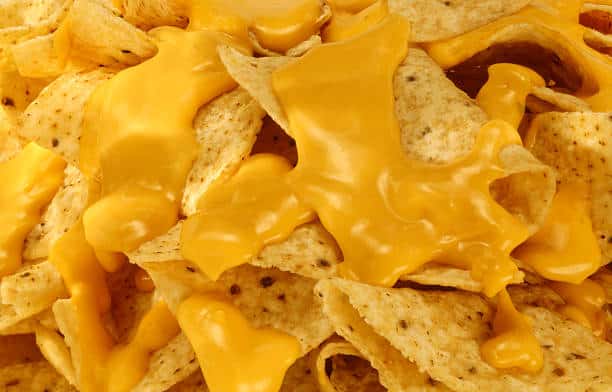
Can Dogs Eat Processed Cheese?
Processed cheese should generally be avoided when it comes to feeding dogs. This type of cheese often contains artificial additives, high levels of sodium, and preservatives.
Decoding Lactose Intolerance in Dogs
Lactose intolerance is a common issue for many dogs. Like humans, some dogs lack the necessary enzyme lactase to break down lactose – the sugar in milk and common dairy products.
A lactose-intolerant dog consuming cheese or other dairy products can lead to a bloated stomach, gas, diarrhea, and stomach pain.
Not all dogs are lactose intolerant. Some may tolerate small amounts of dairy cheese without experiencing any adverse effects. However, it’s best to be cautious and monitor your pet closely after feeding them cheese.
Cheese alternatives are available if you suspect your dog is lactose intolerant or has difficulty digesting. Some dogs can better tolerate low-lactose cheeses like mozzarella or cottage cheese.
Cottage cheese is particularly beneficial as it has lower lactose content than other cheese types.
Consult a veterinarian before introducing new foods into the dog’s diet or making significant changes. Your vet will provide expert advice tailored to your dog’s needs and ensure they receive proper nutrition.
While giving occasional treats like a bit of cheese can be enjoyable for your pooch during training or as a reward, moderation is key. Cheese should never replace a balanced diet specific to your pet’s nutritional requirements.
How Much Cheese is OK for Dogs to Eat?
Cheese can be a tasty treat for dogs, but it’s important to moderate their intake. The amount of safe cheese for dogs depends on body size, weight, and overall health.
Generally, it’s best to only give dogs small amounts of cheese as an occasional treat. Cheese is high in fat and calories, so feeding too much can contribute to weight gain and even obesity.
Excessive cheese consumption can lead to pancreatitis, a serious condition that causes pancreas inflammation. Monitor your dog’s reaction when introducing new foods into their diet, and consult with your veterinarian if you have any concerns.
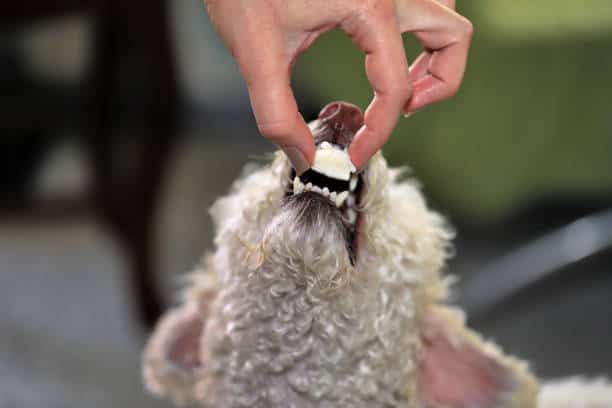
Healthy Alternatives to Cheese for Dogs
Cottage cheese: Low in lactose and fat, cottage cheese is a great substitute for dogs who love cheese taste. It can be given as alternatives for training treats or mixed into their regular meals.
| Food | Benefits |
|---|---|
| Yogurt | Contains probiotics that can help improve digestion and boost the immune system. |
| Pumpkin puree | Rich in fiber and beta-carotene, a nutritious option for dogs. |
| Sweet potatoes | Boiled or baked sweet potatoes contain beneficial amounts of vitamins and minerals. |
| Carrots | Crunchy and low in calories, carrots make an excellent snack for dogs. They are rich in antioxidants and promote good dental health. |
| Green beans | Steamed or lightly cooked green beans are a healthy dog option. They are high in fiber and low in calories. |
How to Safely Feed Cheese to Your Dog?
Cheese is not toxic to dogs but can be difficult to digest. Some dogs may be lactose intolerant, so they cannot properly break down the lactose content in milk products. Here are some tips for safely feeding cheese to your dog:
Choose low-fat cheeses
Cheeses that are high in fat can contribute to weight gain and other health problems. Some good options include cottage cheese, mozzarella, and goat cheese.
Avoid cheeses with herbs or spices
Cheese with garlic and onion can be toxic to dogs. It is best to avoid cheeses that contain these ingredients.
Start small
If your dog has never had cheese, start with a small piece to see how they react. If they do not have any adverse reactions, you can gradually increase the cheese you give them.
Monitor your dog’s reaction
If your dog does have any adverse reactions to cheese, like diarrhea, or gas, stop giving it to them.
Risks of Feeding Cheese to Your Dog
In addition to lactose intolerance, other risks are associated with feeding cheese to dogs. These include –
Weight gain: Cheese is high in fat and calories, so feeding your dog too much can lead to weight gain. This can increase your dog’s risk of developing obesity, leading to other health problems like diabetes and heart disease.
Pancreatitis: Pancreatitis is a serious inflammation of the pancreas. It can be caused by many factors, including eating too much fatty food. If your dog eats too much cheese, it could increase its risk of developing pancreatitis.
Toxicity: Some cheeses contain herbs or spices that can be toxic to dogs. For example, garlic and onion can cause anemia in dogs. Reading the ingredient list carefully before giving your dog cheese is important.
These Dogs Shouldn’t Eat Cheese
Here are some breeds of dogs that should not eat cheese:
Brachycephalic breeds:
Brachycephalic breeds, like pugs, bulldogs, and Boston terriers, are more likely to experience digestive upset from eating cheese. This is because they have short snouts and narrow airways, which can make it difficult for them to digest fatty foods.
Toy breeds:
Toy breeds like Chihuahuas, Maltese, and Pomeranians are more likely to experience digestive upset from eating cheese. They have smaller stomachs and intestines, which can make it difficult for them to digest large amounts of fat.
Dogs with certain health conditions:
Dogs with certain health conditions, like pancreatitis, allergies, or sensitivities, should avoid eating cheese. Cheese is high in fat and calories, which can worsen these conditions.
Author Profile
- Site Owner And Dog Lover
-
Aritra, the founder of Labradorandyou.com, is a lifelong dog lover whose passion ignited for Labradors for their loyalty and intelligence. With extensive research and personal experiences, Aritra has become a Labrador expert, offering a rich resource on the breed. Labradorandyou.com provides reliable, timely, and evidence-based information, including Labrador-specific product reviews, training techniques, and care tips.
Labradorandyou.com was born out of Aritra's passion and his desire to share his profound knowledge about the breed. The site serves as a comprehensive resource, offering a wealth of up-to-date information for Labrador owners and enthusiasts alike
Also by the author
-
 Lab-TypesNovember 17, 2023Old Dog Seizures: Causes, Symptoms, and Treatment Options
Lab-TypesNovember 17, 2023Old Dog Seizures: Causes, Symptoms, and Treatment Options
-
 Lab-TypesNovember 17, 2023Why Is My Dogs Poop Yellow? 8 Reasons & Solutions
Lab-TypesNovember 17, 2023Why Is My Dogs Poop Yellow? 8 Reasons & Solutions
-
 ReviewsNovember 17, 2023The Only Hill’s Science Diet Review You Need To Read
ReviewsNovember 17, 2023The Only Hill’s Science Diet Review You Need To Read
-
 Lab-TypesNovember 17, 2023How To Adopt An Emotional Support Dog?
Lab-TypesNovember 17, 2023How To Adopt An Emotional Support Dog?




